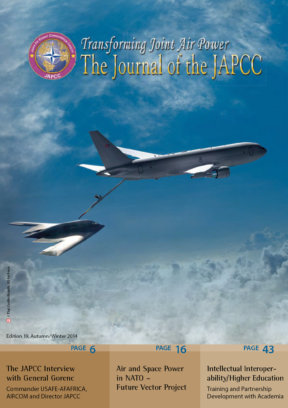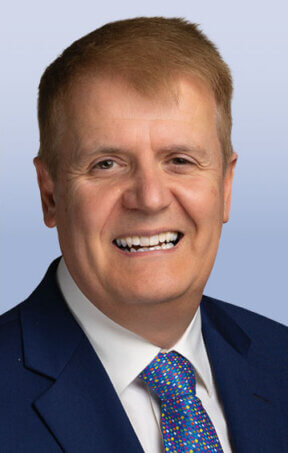Introduction
The read-ahead material for the 2013 JAPCC Conference touched on the concept of ‘Intellectual Interoperability’. In the context of how useful – or even essential – the application of this concept might be for NATO Air Power, it is worth considering the role that Universities might play in this. I will just pause here to ‘declare my interest’ by saying that, after 28 years as a navigator in the Royal Air Force (RAF), I recently began a new career at a United Kingdom (UK) University. I would also add that, whilst my new place of work may not (yet!) be one of the three great Universities (which, as all Blackadder fans know, are Oxford, Cambridge and Hull1) the University of Lincoln did have its roots in one of those three illustrious cities.
The final panel of the JAPCC Conference addressed the issue of education and training post-Afghanistan and asked, specifically, ‘how we will exchange ideas and challenge thinking in ways that add to understanding and effectiveness?’ One of the places where this process of challenging thinking occurs every day is at Universities across the 28 NATO Nations and beyond. NATO air forces attract quality personnel, many of whom start their military careers in their late teens or early 20s. However, the demanding tempo of intensive training and frequent operational deployments may serve to deny these young men and women the luxury of time to think deeply and to challenge that thinking. They may be too busy learning to operate complex weapons platforms and systems, too busy contributing to the mission and, from time to time, too busy simply trying to stay alive.
Some years later – perhaps as Senior NCOs or as Staff-level Officers – how can these same men and women get the breathing space that’s required to engage in challenging the ideas and concepts that they and their colleagues have formulated and modified as their careers progressed? A fortunate few may spend up to a year at military staff college, but many will go on to undertake more and more demanding training. Let’s take just one example of this.
Accreditation of the RAF’s Qualified Weapon Instructor Course
54(R) Squadron at RAF Waddington in the UK delivers a demanding 7 month Qualified Weapons Instructor (QWI) course for subject matter experts in the field of Intelligence, Surveillance and Reconnaissance (ISR) from across the three Services of the UK military (Royal Navy, Army and Royal Air Force) and also from the USAF and US Navy. For several years now, the School of Computer Science at the University of Lincoln has accredited this QWI ISR course towards the attainment of a Master’s of Science (MSc) degree in ISR Management. This is a unique programme which brings together practitioners from a wide area of ISR systems in a comprehensive academic programme. Student experience and prior learning in this field is developed through the study of modules based on a combination of practical scenarios, open discussion and debate and independent study. They make direct contributions in workshops and student prepared and led debates. The students also focus on developing practical solutions to scenarios which build and add to the body of knowledge. The students are supported through access to both RAF Waddington’s and the University of Lincoln’s extensive academic facilities and use this to produce an original thesis or piece of work of around 25,000 words.
In this way, the already demanding seven month RAF QWI ISR course gains further academic rigour and lays the foundations for a two year MSc degree. This is, by no means, an easy route to take to a Master’s degree. However, those who graduate from the programme know that their level of learning and academic rigour sets them alongside other holders of prestigious post graduate qualifications.
Intellectual Interoperability is Not About Teaching Everyone to Think the Same Way …
Could this contribute to intellectual interoperability across NATO? It is hard to see how it could fail to do so. ISR subject matter experts from across NATO will know that they can converse and exchange ideas at a similar intellectual level. They will know that the ideas and arguments that they may share in have been tested and hardened in the fire of academic debate. Programmes like this are by no means unique to UK Universities. Partnerships between the military and Higher Education Institutions exist across NATO, and more are being developed all the time. The model of partnership and cooperation between academia and the military is one that is open to variation and adaptation. It cannot be patented and no one can claim rights to the intellectual property. It is, therefore, available to all those who wish to make use of it.
Intellectual interoperability is not, however, about teaching everyone to think the same way – that way could lie disaster and ‘groupthink’. Nor is it about teaching everyone just to think. For while this may be a noble cause, I am not alone in believing that this is something that cannot be taught, it can only be learned. But perhaps the route to intellectual interoperability lies in giving NATO military practitioners the opportunity to spend some time thinking? University programmes that run in parallel with military programmes are one way of achieving this. Programmes where military personnel spend some time at a University – even a few days each year – give an intellectual breathing space. Out of their military uniform, without their badges of rank and branch, they must rely on the power of their own intellect and the strength of their academic argument to persuade others. For even the most experienced military personnel, this can be a challenging experience.
The example, given earlier, of a two year MSc degree is not the only way in which Universities can add value to military education and training. The University of Lincoln is about to host a small group of senior NATO officers for a one week residential course aimed at enhancing academic research skills. After their week in Lincoln, they will be supported via e-learning for a further eight weeks as they write an essay based on their academic research. This short University course earns them credits which can be used towards a more substantial qualification in the future.
Ideas from the JAPCC Conference
A particularly interesting point made at the JAPCC Conference was the need for non-native speakers to have the opportunity for ‘total immersion’ in the English language whilst, at the same time, engaging in intellectual debate. Perhaps a UK University has a role to play here? It is certainly something that we could explore together. Giving enhanced academic credibility to the professional training and education of NATO military personnel is one way in which this could be achieved. However, I feel that it is about far more than merely enhancing academic credibility and giving personnel the chance to gain universally recognised qualifications. In Air Commodore Paddy Teakle’s recent article in this Journal (Ed. 17, 2013) he talks about the need to integrate the five domains of Air, Land, Maritime, Space and Cyber in order to generate optimum military momentum. He suggests that this can only be achieved ‘if every element of the military machine trusts and understands the others and the key to that particular puzzle lies in education and training’. The Universities (and not just Captain Blackadder’s famous three) have a clear role to play here.












